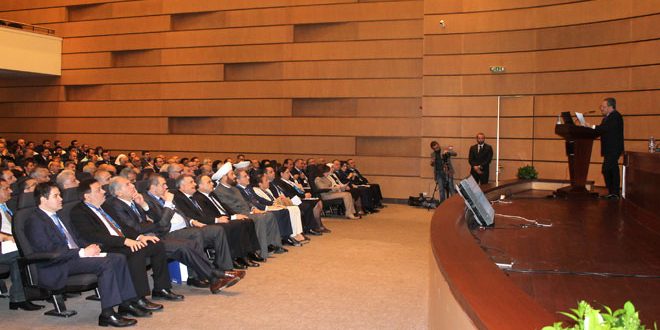DAMASCUS– Activities of “War on Syria, its repercussions and prospects” Conference, organized by the British Syrian Society, kicked off in Damascus University Auditorium on Wednesday.
The two-day conference discusses the living conditions of the Syrians as well as the repercussions and challenges which face Syria during the current terrorist war waged against its people and future prospects after the end of this war, according to the Syrian News Agency SANA.
The first day discussions focused on issues related to the fuel crisis, electricity, transportation and the role of administrative, juridical and legislative reforms in combating corruption as well as the situation of health sector in light of the unilateral unjust procedures.
Prime Minister Imad Khamis said that the war on Syria targeted the energy sector at the first place and the transportation sector, particularly railways through which oil products are transported from wells to the refineries and power generation plants.
He underlined the government’s exceptional measures to consolidate the steadfastness of this sector through the rehabilitation of infrastructures of terror-affected facilities, in addition to signing long-term agreements with the friendly countries on importing oil products.
Head of the British Syrian Society, Fawaz al-Akhras, stressed the need for clear and specific legislative procedures to reduce the negative consequences of this war on the Syrian people, adding that this could be achieved through setting up programs that reflect the Syrians’ complaints and concerns, encouraging Syrian investors to return back and attracting capitals to rebuilding the country.
Minister of Oil and Mineral Resources, Ali Ghanem reviewed the situation of the oil sector, noting to the challenges associated with providing citizens’ needs of oil derivatives and the burdens which the government bears to meet these needs.
For his part, Electricity Minister Mohammed Zuhair Kharboutli said that the sector has been subjected to systematic destruction putting several electricity stations out of service, not to mention the damage caused to power lines and networks, indicating to the ministry’s efforts to rehabilitate the terror-affected infrastructures and enhance the strength of the Syrian electricity network.
In turn, Transport Minister Ali Hammoud referred to the ministry’s efforts to improve performance, expand strategic roads, develop air transport sector, and rehabilitate railways in areas to which the Syrian Arab army restored security and stability to.
Grand Mufti of the Republic, Ahmad Badr Eddin Hassoun, said that the rebuilding process in Syria has been launched and never stopped despite terrorism.
He noted attempts to improve religious mentality, stressing the need to set up a work plan to enhance the role of women and focus on children to the rebuilding of human.
The second session of discussions dealt with the role of administrative, judicial and legislative reforms in combating corruption and the establishment of a unified and independent national body for that purpose.
Presidential Political and Media Advisor, Bouthaina Shaaban, stressed the need for serious work mechanism to confront corruption, hold the corrupted people accountable, reconsider the administrative system in the state and establish a consultative council in every ministry.
Minister of Justice, Hisham al-Shaar indicated that the juridical infrastructure has been subjected to devastating destruction due to the terrorist attacks.
While Minister of Administrative Development, Salam Safaf said that the administrative development and reform require social and institutional pillars, indicating to the ministry’s future projects such as administrative performance measurement in public sector.
The conference aims at preparing a document including outcomes of what has been discussed during the event and recommendations to be adopted by the parties concerned in order to be a basis for another activity that will be held in London.

